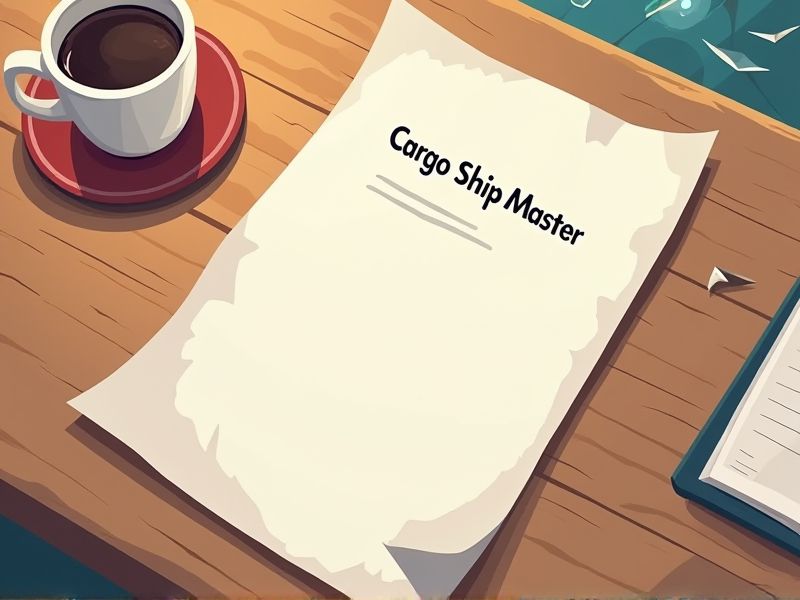
Cargo Ship Master's role holds significant responsibilities, primarily ensuring the vessel's and crew's safety, while completing logistical operations efficiently. Holding certain certifications becomes crucial as they validate a master's competence in navigation and maritime regulations. Regulatory bodies like the International Maritime Organization mandate these certifications to maintain global trade standards and avoid disruptions. Important certifications necessary for a Cargo Ship Master are discussed below.
STCW Basic Safety Training Certificate
The STCW Basic Safety Training Certificate is crucial for a Cargo Ship Master due to international regulations that mandate standardized safety training for maritime professionals. Possessing this certificate ensures that the master has fundamental skills in fire prevention, firefighting, survival techniques, and emergency procedures, critical in maintaining crew safety. This training contributes to efficient crew leadership and coordination during crises, minimizing potential loss and damage. Accreditation signifies compliance with global maritime safety standards, facilitating international shipping operations without legal hindrances.
Advanced Firefighting Certificate
The Advanced Firefighting Certificate equips a cargo ship master with crucial skills in managing and directing firefighting operations onboard, which can prevent catastrophic losses. This training enhances understanding of how fires can affect ship stability and cargo integrity, leading to more informed decision-making during emergencies. International maritime regulations, like STCW, require such certification, thus ensuring consistent safety standards across global shipping operations. Proper firefighting knowledge in a cargo ship master reduces response time in critical scenarios, potentially saving both lives and valuable cargo.
Proficiency in Survival Craft and Rescue Boats Certificate
Proficiency in Survival Craft and Rescue Boats Certificate ensures that a Cargo Ship Master can effectively manage evacuation procedures in emergencies. The certificate equips the master with essential skills to handle and deploy rescue boats, improving crew and passenger safety. Given the unpredictable nature of maritime environments, this training enhances the ship's overall preparedness and response capability. Regulatory bodies often mandate this certification to uphold international safety standards at sea.
Medical First Aid Certificate
The requirement for a Medical First Aid Certificate for a Cargo Ship Master stems from the necessity to address medical emergencies at sea where professional medical help is often not immediately available. Possessing this certification equips the ship master with the skills to manage injuries and illnesses that arise during voyages, enhancing onboard safety. Regulations like the STCW (International Convention on Standards of Training, Certification, and Watchkeeping for Seafarers) mandate such qualifications to ensure maritime personnel can respond effectively to health crises. Compliance with these standards not only aligns with international maritime laws but also boosts the ship's operational integrity and crew morale.
Bridge Resource Management (BRM) Certificate
A Bridge Resource Management (BRM) Certificate is crucial for a Cargo Ship Master as it enhances decision-making efficiency, minimizing human error in navigation. The certificate ensures effective communication among bridge team members, crucial for coordinating complex operations. Training in BRM equips the master with skills to optimize workload distribution, enhancing safety during high-pressure situations. Compliance with international maritime regulations often requires ship officers to possess a BRM Certificate, underscoring its significance in industry standards.
Global Maritime Distress and Safety System (GMDSS) Certificate
The GMDSS Certificate equips a Cargo Ship Master with the skills necessary for effective communication and distress signaling in emergencies, reducing risks at sea. Regulations under the International Maritime Organization mandate it for compliance, ensuring standardized safety protocols in global waters. With advanced knowledge of radio and satellite communication, the master minimizes response time during crises, enhancing crew and vessel safety. The certificate also enables participation in international rescue missions, expanding cooperation and support interventions across vessels.
Electronic Chart Display and Information System (ECDIS) Certificate
The ECDIS Certificate ensures that a Cargo Ship Master is proficient in navigating using electronic charts, which enhances safety at sea. Regulatory bodies require certified ECDIS training because it minimizes the risk of human error during navigation. The certificate also equips the master with skills to efficiently interpret real-time data, vital for avoiding potential hazards. ECDIS certification is mandated to comply with international maritime regulations, which helps in standardizing training and competence levels globally.
Advanced Ship Handling and Manoeuvring Course Certificate
Possessing an Advanced Ship Handling and Manoeuvring Course Certificate equips a Cargo Ship Master with specialized skills to navigate complex maritime environments effectively. Enhanced maneuvering abilities reduce the likelihood of accidents, leading to increased safety for the vessel, crew, and cargo. Proficient ship handling directly impacts fuel efficiency and operational costs, contributing to improved economic performance. Regulatory compliance with evolving international maritime standards often necessitates formal training, ensuring masters meet industry expectations for competency.
International Maritime Dangerous Goods (IMDG) Certificate
The IMDG Certificate is required for a Cargo Ship Master to ensure the safe transportation of hazardous materials at sea. It provides the necessary knowledge and skills to comply with international regulations, reducing the risk of incidents. This certification trains the master in handling and emergency response procedures, essential for maintaining safety onboard. It also facilitates the ship's compliance with legal and environmental standards, crucial for operating within international waters.
Leadership and Management in Maritime Operations Certificate
Acquiring a Leadership and Management in Maritime Operations Certificate equips a Cargo Ship Master with essential skills to effectively manage crew dynamics and enhance safety protocols. It sharpens decision-making capabilities that are crucial for addressing the complex challenges encountered during maritime voyages. The certificate strengthens compliance with international maritime regulations, reducing the risk of legal complications. It also emphasizes efficient resource management, ensuring optimal operational performance and cost efficiency.
Summary
When you obtain certifications as a Cargo Ship Master, you enhance your credibility and increase potential job opportunities. Certification leads to improved knowledge of best practices and safety regulations, contributing to more efficient and safer ship management. Your certification demonstrates commitment to professional development, which can elevate your status among peers and superiors. Expect improved competence in navigating international shipping routes, potentially resulting in higher salary and job stability.
